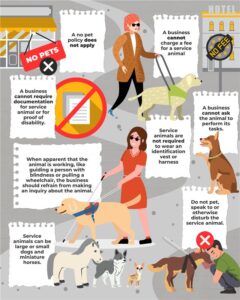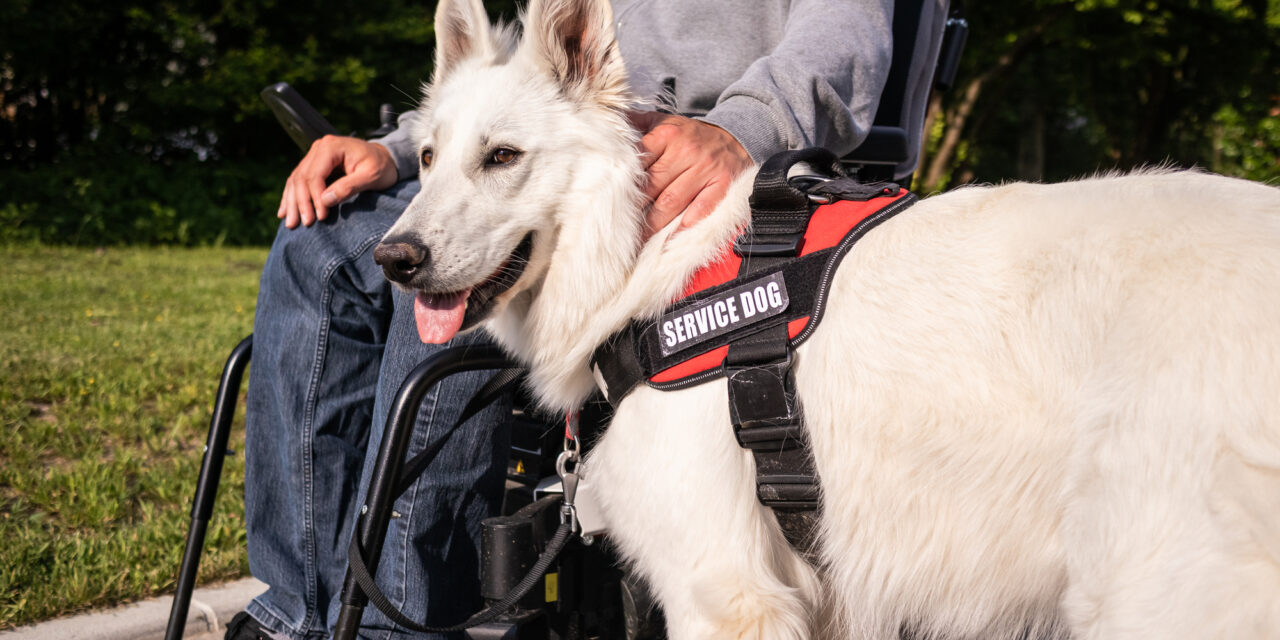Understanding the rules surrounding service animals is crucial for businesses to create inclusive and accessible environments. What kinds of questions can you or your employees ask when a customer walks in with an animal? Can you straightaway ask them to sit outside? Can you ask to see proof the animal is a service animal? What if a customer walks in with a miniature horse?
Those individuals who rely on these animals for assistance have rights and responsibilities, and there are rules and regulations for businesses when a customer has a service animal.
What is a service animal?
At the heart of this discussion is understanding what constitutes a service animal. State law defines a service animal as “any dog or miniature horse that is individually trained to do work or perform tasks for the benefit of an individual with a disability, including a physical, sensory, psychiatric, intellectual, or other mental disability. The work or tasks performed by the service animal must be directly related to the individual’s disability.”
Some may find it surprising to learn that miniature horses can be classified as service animals. Their inclusion is due to their cost-effectiveness in training and their longer lifespans, among other reasons.
It is important to note that service animals in training are not covered under this act and businesses are not obligated to permit them in their establishment.
What is not a service animal?
On the other hand, it’s equally important to understand what does not qualify as a service animal. Pets, emotional support animals, comfort animals and therapy animals are not recognized as service animals under Title II and III of the Americans with Disabilities Act. The law states “service animals are limited to dogs. However, entities must make reasonable modifications in policies to allow individuals with disabilities to use miniature horses if they have been individually trained to do work or perform tasks for individuals with disabilities”.
What are the rights of business owners?
The Human Rights Commission details the two specific questions business owners are legally allowed to ask.
- A business can ask if the animal is required because of a disability (i.e. is the animal a pet or is it a service animal). If the handler answers that the animal is for a disability or is a service animal, the business can proceed to a second question.
- The business can ask what work or task the animal is trained to do, such as, “What is this animal trained to do for your disability?” The answer to this question will determine if the business needs to allow the animal or if it can exclude the animal.
These rights and responsibilities of both businesses and service animal handlers are clearly delineated. Businesses are required to allow service animals into all public parts of their establishments, including food establishments. They “cannot segregate the service animal and its handler to a specific part of the place of public accommodation.” For example, this means you cannot ask the service animal and handler to only sit outside on the patio. However, it’s important to note that other animals are prohibited by law in food establishments. You may wish to post signage that clearly explains to customers that no pets or other animals are permitted in your establishment.
For business owners, understanding and adhering to these regulations is key. Misunderstanding or failure to comply can lead to legal penalties. Similarly, for those with service animals, it’s crucial to ensure that they behave appropriately. They should not wander around, socialize or eat from the table. If such behavior continues after a warning, businesses have the right to ask the animal to leave. Here are some further notes on what to do if a service animal is bothering another customer or if they have allergies.
The infographic below expresses other vital notes from the Human Rights Commission for business owners.

If an incident were to happen with a service animal or pet in an establishment with whom does liability lie?
The care and liability of the animal is the sole responsibility of the handler and restaurants have no obligation to the respective animal. If the service animal barks, growls or poses a direct threat to your customers or staff you may ask the handler to remove the service animal. However, this cannot be based on prior experience or your own personal assumptions of animal behavior. Read here for more information.
Notes for those with service animals
Misrepresentation of an animal as a service animal is a serious offense and is subject to a penalty of up to $500. “If a person refuses to answer the allowable questions, then it is presumed that the animal is not a service animal and the enforcement officer may issue a civil infraction and require the person to remove the animal from the place of public accommodation”.
For more information visit the Human Rights Commission’s Guide to Service Animals and the Washington Law Against Discrimination.














